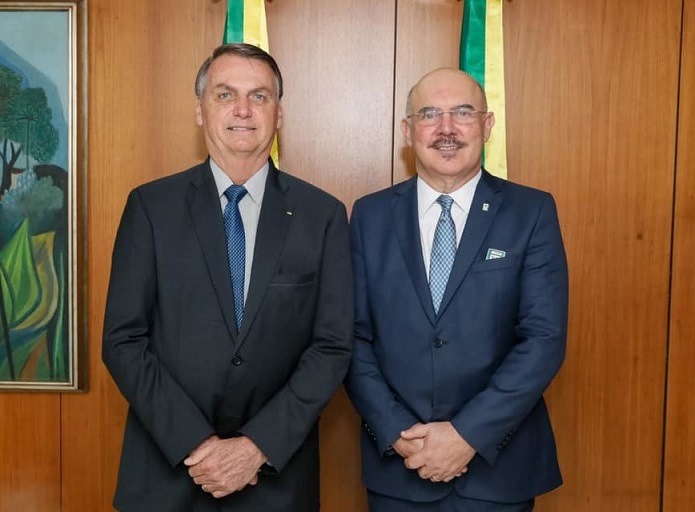RIO DE JANEIRO, BRAZIL – At his inauguration on Thursday afternoon, July 16th, the new Minister of Education, Milton Ribeiro, signaled his commitment to dialogue with academics, to a secular state, and in favor of public education.
He referred to early childhood education and professional education as focal points in his administration. The ceremony, which was held at the Planalto Palace, was followed by President Jair Bolsonaro by videoconference, in isolation due to coronavirus.

“I have religious training. My commitment, which I undertake today as I take office, is firmly rooted and based on constitutional principles, the secularity of the state and public education. So, help me God,” Ribeiro said upon officially taking office. He is an attorney, theologian, and Presbyterian pastor.
His appointment to the post was promoted by the Minister of the General Secretariat, Jorge Oliveira, and the Minister of Justice, André Mendonça, also a Presbyterian. Among the attributes that prompted Ribeiro to be selected is the “regard for family and values,” say acquaintances and government members. Ribeiro was Mackenzie University’s vice-dean, when the dean was former São Paulo governor Claudio Lembo, but is unknown among education specialists.
The new Minister said that when he was invited to the position, Bolsonaro emphasized that he wanted to prioritize early childhood education and professional education at the Ministry of Education (MEC). And he committed himself to follow that direction.
“When I was honored by the President’s invitation to take over MEC, among other things, he told me, ‘Look with affection at the education of children and professional education’. Today, I publicly commit myself that we will follow that direction,” he said. “Furthermore, by encouraging professional courses, we want youths to have a bridge to the labor market. A way for them to reach their potential to contribute to our country,” he added.
He also stated that he wishes to “open a broad dialogue to listen to academics and educators.” And he mentioned that, like himself, teachers are “saddened by what is happening with education in our country.” “Let’s look at our standards and positions in the Pisa ranking,” he said, referring to the world education assessment in which Brazil is among the 20 worst placed.
Ribeiro also said he’s never advocated physical violence in school education. “I will never champion such a practise, which is part of a past that we don’t want to return to.” In a 2018 video, Ribeiro advocated that children be educated “with pain”.
He then said that “the implementation of misguided educational policies and philosophies” destroyed a teacher’s authority in the classroom and, as a result, “there are often instances of physical violence by some bad students against teachers.” “The same critical voices in our society should take a stand against such events with the same intensity (…) We need to restore respect for teachers.”
Institutions linked to education expect the new Minister to deepen the dialogue for problem solving, in particular in relation to the challenges brought about by the coronavirus pandemic. “We are here at the front line, we need to be heard. We hope that the Minister will listen to us and consider our questions,” says Cecilia Motta, president of the National Council of Education Secretaries (CONSED).
According to Cecilia, a potential return to the classroom, after a period of over four months with schools closed, will require a range of changes in educational institutions. She lists everything from the requirement for washbasins to readjustments in the teaching staff to accommodate teachers with comorbidities. “There should be a financial contribution from the MEC. We must go back and several things must be acquired.”
For Edward Madureira Brasil, vice-president of the National Association of Federal Institutions of Higher Education Directors (ANDIFES), the Minister must also establish a relationship of trust with the federal universities. “The ANDIFES hopes for dialogue, something that was very difficult with the prior Minister during this period.” The association also calls for relief in budget restrictions, so that universities may fulfill their role. During the administration of ex-Minister Abraham Weintraub resources for higher education institutions were blocked, which led to a string of protests.
“With adequate funding, universities are able to do many things. This can’t be a point of concern. Universities should be concerned with real problems, such as the development of vaccines and ventilators,” says ANDIFES’ vice-president and dean of the Federal University of Goiás (UFG). He also hopes universities’ autonomy in relation to the appointment of deans will be respected. MEC has appointed deans who had not been selected by the university community.
According to Priscila Cruz, executive president of ‘Todos Pela Educação’ (All for Education), it is urgent that MEC take responsibility for coordinating actions “to minimize brutal impacts on basic education because of the crisis caused by Covid.” The educational response to the pandemic has been provided by the Secretaries of Education and the National Education Council. In addition to emergency actions, there are also structuring actions such as improving the initial training of teachers and support for full-day education.
She says that so far not only has there been no dialogue with other bodies that make up the public management of education, but “bridges have been burnt”. “Dialogue does not only give greater legitimacy to actions – coordination is required because the implementation of policies involves several players who need to be aligned. Otherwise, the design loses its power. MEC has isolated itself all this time, it could be an important player, but it has given up its influence and contributing power.”
Regarding the Fund for Maintenance and Development of Basic Education (FUNDEB), the continuity of which should be put to a vote in the Chamber of Deputies next week, MEC should support the approval of the text, says Priscila. “We have a much-debated text, a potential consensus, with the involvement of the Ministry of Economy”.
Source: Estadão Conteúdo

